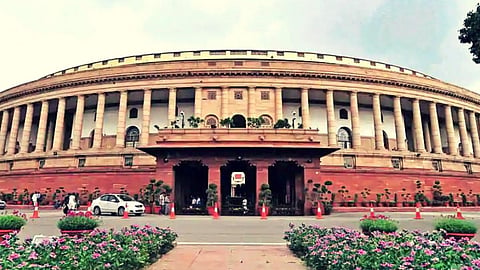

DAYS before Parliament's winter session, the President of India Sunday promulgated two Ordinances, namely, the Central Vigilance Commission (Amendment) Ordinance, 2021 and the Delhi Special Police Establishment (Amendment) Ordinance, 2021 to extend the tenures of the Director, Enforcement Directorate (ED) and the Director, Central Bureau of Investigation (CBI), respectively, up to five years from the current two years' tenure.
The ordinances imply that both the CBI and the ED director will have a fixed tenure of two years as prescribed in their respective statutes already. However, they can be given an extension each year as long as the annual extensions don't exceed a sum of five years of tenure in total from the initial date of appointment. It would thus mean that the extension beyond the two years of initial appointment will depend upon the subjective satisfaction of the appointment authority each year.
The Ordinances, thus, instead of fixing five years of tenure at one go, make the tenures of the CBI and ED director subject to the pleasure of the Executive after two years of initial appointments.
Both the Ordinances state that Parliament is not in session and the President is satisfied that circumstances exist which render it necessary for him to take immediate action. The Ordinances have been issued on the heels of ED director Sanjay Kumar Mishra's tenure coming to end on November 17. The Supreme Court on September 8 held that Mishra would not be given any further extension.
The first Ordinance provides an amendment to Section 25 of the Central Vigilance Commission Act, 2003. This adds a proviso to the section to the effect that the tenure of the ED Director can be extended to one year at a time from his initial appointment of two years, but no such extension will be granted after the completion of a period of five years in total including the period mentioned in the initial appointment.
Any extension so provided will be on the recommendation of a committee comprising the Central Vigilance Commissioner, the Home Secretary, the Secretary (Personnel), and the Secretary (Revenue). This is the same Committee that recommends a name for the ED director post for the initial appointment.
In September this year, the Supreme Court had refused to quash the central government's order extending the tenure of Mishra as ED Director with retrospective effect, making it a three-year tenure against the initial two years, even though Mishra had attained superannuation in the interregnum, that is, before the expiry of two years. The Court had, however, clarified that Mishra would not be given any further extension beyond November 17 when he would be completing 3 years of the tenure. This ruling came on a petition filed by the NGO Common Cause, challenging the extension order issued by the central government. The apex court had upheld the power of the Centre to extend the tenure of the ED director beyond superannuation of the incumbent, provided it is done in rare and exceptional cases for a short duration.
The Ordinance apparently has been issued to scuttle the hurdles created by the Supreme Court to deny any further extension to Mishra.
The second Ordinance concerns the tenure of the CBI Director. It takes a similar approach as adopted in the first Ordinance. It amends Section 4B of the Delhi Special Police Establishment Act, 1946 (DSPE Act) adding a proviso to the effect that the tenure of the CBI Director can be extended to one year at a time from his initial appointment of two years, but no such extension will be granted after the completion of a period of five years in total including the period mentioned in the initial appointment.
Under the DSPE Act, the appointment of a CBI director is made by a High Powered Committee comprising the Prime Minister, the leader of the single largest opposition party, and the Chief Justice of India (or any Judge of the Supreme Court nominated by the CJI). The Ordinance clarifies that the extension in the appointment of the CBI Director will be made on the recommendation of the High Powered Committee and for the reasons to be recorded in writing.
Section 4B of the DSPE Act, 1946 fixes a tenure of not less than two years of the CBI's director. It says: "The Director shall, notwithstanding anything to the contrary contained in the rules relating to his conditions of service, continue to hold office for a period of not less than two years from the date on which he assumes office." Further, Section 4B(2) puts a bar on the transfer of the CBI director without the previous consent of the committee that initially recommends the names for the appointment of the CBI director.
The incumbent CBI Director Subodh Kumar Jaiswal was appointed on May 25 this year, for a period of two years from the date of assumption of charge "or until further orders whichever is earlier". It was noted that the phrase "until further orders whichever is earlier" was conspicuous in its absence in the notification appointing Jaiswal's predecessor.
Much before the statutory backing to protect the independence of the CBI by providing fixed tenure to its Chief, the Supreme Court in 1998 in its judgment in the case of Vineet Narain & Ors. vs. Union of India had held that the Director, CBI shall have a minimum tenure of two years, regardless of the date of his superannuation. This would ensure that an officer suitable in all respects is not ignored merely because he has less than two years to superannuate from the date of his appointment.
Further, the transfer of an incumbent CBI Director in an extraordinary situation, including the need for him to take up a more important assignment, should have the approval of the Selection Committee, as per the Supreme Court's 1998 verdict.